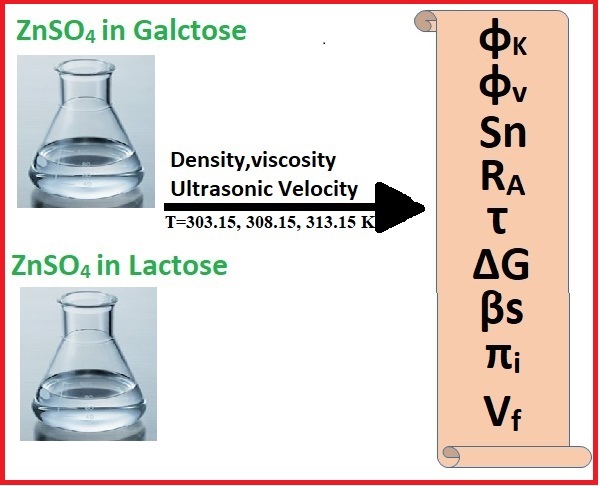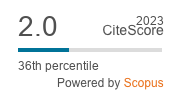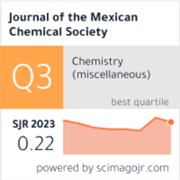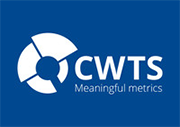Studies on Apparent Molal Compressibility and Molal Volume of ZnSO4 in Aqueous Saccharides Mixed Solvent Systems: A Comparative Study
DOI:
https://doi.org/10.29356/jmcs.v65i2.1240Keywords:
Speed of sound, thermo-acoustic parameters, apparent molal volume, structure breaking effect, galactose, saccharidesAbstract
Abstract. Different metal ions as well as carbohydrates play vital role in human metabolism. The present investigation emphasizes on zinc sulphate (ZnSO4) in galactose and its comparative study with lactose in aqueous medium at 303.15, 308.15, 313.15K temperature and at 1.0 atmospheric pressure. Different physical quantities such as density, viscosity and speed of sound have been measured as function of concentrations and temperatures for these multi-component solutions. These quantities were further used to evaluate various thermo-acoustic parameters like acoustic impedance, isentropic compressibility, partial molal compressibility, partial molal volume, internal pressure etc,. The results were analyzed to assess the type and extent of association among the components. Moreover, both Zn2+ and SO42- are in the Hofmeister series and there is a possibility of ion-macro molecule interactions in aqueous solution. The breaking of the structure and the solvation of the solute by changing the temperature in mixed solvents are the point of discussion in the present study. Interestingly, the ion-solvation of zinc ion is comparatively more favorable in galactose than in lactose-water mixed solvent systems.
Resumen. Diferentes iones metálicos, así como carbohidratos juegan un papel vital en el metabolismo humano. La presente investigación centra su atención sobre el sulfato de zinc (ZnSO4) en galactosa y un estudio comparativo con lactosa en soluciones acuosas a las temperaturas 303.15, 308.15, 313.15K y 1 atm de presión. Se midieron diferentes cantidades físicas como densidad, viscosidad y velocidad del sonido como función de la concentración y la temperatura de las soluciones. Posteriormente, estas cantidades se utilizaron para evaluar distintos parámetros termoacústicos como impedancia acústica, compresibilidad isoentrópica, compresibilidad molal parcial, volumen molal parcial, presión interna, etc. Los resultados se analizaron para evaluar el tipo y grado de la asociación entre los componentes. Mas aún, tanto Zn2+ como SO42- están en las series de Hofmeister y hay una posibilidad de presencia de interacciones ión-macromolécula en la solución acuosa. Un punto de discusión en el presente estudio es el rompimiento de la estructura y la solvatación del soluto debidos al cambio de la temperatura de las soluciones. Es interesante hacer notar que la solvatación de los iones de zinc es comparativamente mas favorable en las soluciones acuosas de galactosa que de lactosa.
Downloads
References
Hussain, M. R. M.; Hassan, M.; Shaik, N. A.; Iqbal, Z. Cent. Eur. J. Med. 2012, 7, 409-419. DOI: https://doi.org/10.2478/s11536-012-0022-z
Lane, T.W.; Francis, M.; Morel, M. A. Proc. Nat Acad. Sci.. 2000, 97, 4627-4631. DOI: https://doi.org/10.1073/pnas.090091397
Staiger, M.P.; Pietak, A.M. Biomaterals 2006, 27,1728-1734. DOI: https://doi.org/10.1016/j.biomaterials.2005.10.003
Pfeiffer, C. C.; Braverman, E. R. Biol. Psychiatry. 1982, 17, 513-532.
Evans, G. W. Clin. Physiol. Biochem. 1986, 4, 94-98.
Khan, W. U.; Sellen, D. W. e-Library of Evidence for Nutrition Actions, University of Toronto, Toronto, Canada 2011.
Nalle, P. B.; Birajdar, S. D.; Shinde, B. R.; Dorik, R. G.; Jadhav, K. M. Cogent. Chem. 2016, 2, 1216721. DOI: https://doi.org/10.1080/23312009.2016.1216721
Thakur, R. C.; Sharma, R.; Meenakshi; Kumar, A. Orient. J. Chem. 2015, 31, 363-369. DOI: 10.13005/ojc/310143 DOI: https://doi.org/10.13005/ojc/310143
Swain, B.; Mishra, R. N.; Dash, U. N. J. Pure Appl. Ultrason. 2016, 38, 14-22.
Kumar, A.; Bamezai, R. K. Russ. J. Phys. Chem. A. 2018, 92, 2196-2203. DOI:10.1134/S0036024418110043. DOI: https://doi.org/10.1134/S0036024418110043
Mehra, R.; Malav, B. B. Arabian J. Chem. 2017, 10, S1894-S1900. DOI: https://doi.org/10.1016/j.arabjc.2013.07.018
Nithiyanantham, S.; Palaniappan, L. Chem. Sci. Trans. 2013, 2, 35-40. DOI:10.7598/cst2013.262 DOI: https://doi.org/10.7598/cst2013.262
Nithiyanantham, S.; Palaniappan, L. Asian J. Chem.. 2010, 22, 5413-5418.
Rohini, V.; Kesavasamy, R.; Chitra Devi, R. Mater. Today: Proc. 2018, 5, 16494-16500. DOI: https://doi.org/10.1016/j.matpr.2018.06.002
Riyazuddeen,; Mohd A. U. J. Chem. Eng. Data 2011, 56, 3504-3509. DOI: https://doi.org/10.1021/je2000205
Thirumaran, S.; Job, K. S. J. Exp. Sci. 2012, 3, 33-39.
Kumar, A.; Rani, R.; Saini, B.; Bamezai, R. K. J. Mol. Liq. 2017, 241, 237-245. DOI: https://doi.org/10.1016/j.molliq.2017.06.004
Kamila, S.; Ganesh, D. N.; Dash, J. K. Phys. Chem. Liquids. 2017, 55, 396-409.DOI: https://doi.org/10.1080/00319104.2016.1218492
Perez-Jimenez, R.; Godoy-Ruiz, R.; Ibarra-Molero, B.; Sanchez-Ruiz, J. M. Biophys. J. 2004, 86, 2414-2429. DOI: https://doi.org/10.1016/S0006-3495(04)74298-8
Curtis, R. A.; Lue, L. A. Chem. Eng. Sci. 2006, 61, 907-923. DOI: https://doi.org/10.1016/j.ces.2005.04.007
Lo Nostro, P.; Ninham, B.W.; Milani, S.; Fratoni, L.; Baglioni, P. Biopolymers. 2006, 81, 136-148. DOI: https://doi.org/10.1002/bip.20389
Sarah, C.; Flores,; Jaibir, K.; Nicole, K.; Xin, C.; Paul, S.; Cremer. J. Phys. Chem. C 2012, 116, 5730?5734. DOI: https://doi.org/10.1021/jp210791j
Yanjie, Z.; Paul, S. Curr. Opin. Chem. Biol. 2006, 10, 658–663. doi: 10.1016/j.cbpa.2006.09.020 DOI: https://doi.org/10.1016/j.cbpa.2006.09.020
Harold, A.; Scheraga. Acc. Chem. Res. 1979, 12, 7-14. DOI: https://doi.org/10.1021/ar50133a002
Roy, M. N.; Chakraborti, P. J. Mex. Chem. Soc. 2014, 58, 106-112.
Ganesh, D.N.; Vinay, S.; Kamila, S. Am. J. Appl. Sci. 2020, 17, 56-68. DOI: https://doi.org/10.3844/ajassp.2020.56.68
Dash, J. K.; Kamila, S. J. T. U. Sci. 2017, 11, 801-807. DOI: https://doi.org/10.1016/j.jtusci.2016.10.007
Thirumaran, S.; Job Sabu, K. Indian J. Pure Appl. Phys. 2009, 47, 87-96.
Thirumaran, S.; Job Sabu, K. J. Exp. Sci. 2012, 3, 33-39.
Kaminsky, M. Disc. Faraday Soc. 1957, 24, 171-179.DOI: https://doi.org/10.1039/df9572400171
Tyrvell, H. J. V.; Kennerly, M. J. J. Chem. Soc. A 1968, 2724-2728. DOI: https://doi.org/10.1039/J19680002774 DOI: https://doi.org/10.1039/J19680002724
Kamila, S.; Chakravortty, V.; Jena, S. J. Soln.Chem. 2004, 33, 365-380. DOI: https://doi.org/10.1023/B:JOSL.0000036307.76436.a0
Sadeghi, R.; Shekaari, H.; Hosseini, R. J. Chem. Thermodyn. 2009, 41, 273–289. doi:10.1016/J.JCT.2008.09.005 DOI: https://doi.org/10.1016/j.jct.2008.09.005
Bahadur, I.; Deenadayalu, N. J. Solution Chem. 2011, 40, 1528–1543. DOI: https://doi.org/10.1007/s10953-011-9740-0
Zafarani-Moattar, M. T.; Shekaari, H. J. Chem.. Thermodyn. 2005, 37, 1029–1035. DOI: https://doi.org/10.1016/j.jct.2005.01.009
Dhondge, S.S.; Pandhurnekar, C.P.; Garade, S.; Dadure, K. J. Chem. Eng. Data 2011, 56, 3484-3491. DOI: doi/abs/10.1021/je2000099 DOI: https://doi.org/10.1021/je2000099
Dhanalakshmi, A.; Vasantharani, E. J. J. Pure. Appl. Ultrason. 1999, 21, 79-82.
Suryanarayana, C.V. J. Acoust. Soc. Ind. 1976, 4, 75-85.
Suryanarayana, C.V. J Acoust. Soc. Ind. 1979, 7, 131-136.
Hildebrand, J. H. J. Chem. Phys. 1959, 31, 1423-1425. DOI: https://doi.org/10.1063/1.1730616
Bahadur Alisha, S.; Rao, K. C. J. Pure Appl. Ultrason. 2001, 23, 26-30.
Kannappan, A. N.; Palani, R. Ind. J. Pure Appl. Phys. 2007, 45, 573-579.
Jahagirdar, D.V.; Arbad, B. R.; Patil, C. S. Ind. J. Pure Appl. Phys. 2000, 38, 645–650.
Wananje, K. H.; Kabra, K. B. Bionano Frontier. 2015, 8, 381–383.
Kannappan, A. N.; Thirumaran, S.; Palani, R. J. Phys. Sci. 2009, 20, 97-108.
Suryanarayan, C. V.; KuppuSamy. J. Acoust. Soc. Ind. 1981, 9, 4-8.
Gupta, J.; Nain, A. K. J. Mol. Liq. 2019, 278, 262-278. DOI: https://doi.org/10.1016/j.molliq.2019.01.036
Patyar, P.; Kaur, G.; Kaur, T. J. Solution Chem. 2018, 47, 2039-2067. DOI: https://doi.org/10.1007/s10953-018-0829-6
Passynski, A. Acta Physicochim. URSS 1938, 8, 357-373.
Kannappan, V.; Chidambara, V. S. Ind. J. Pure Appl. Phys. 2007, 45, 143-150.
Mehra, R.; Sajnami, H. Ind. J. Pure Appl. Phys. 2000, 38, 762-765. DOI: https://doi.org/10.1159/000020376
Marcus, Y. J. Phys. Chem. B 2005, 109, 18541-18545. https://doi.org/10.1021/jp051505k
Palani, R.; Balakrishnan, S.; Arumugam, G. J. Phys. Sci. 2011, 22, 131-141.
Kannappan, A. N.; Kesavasamy, R.; Ponnuswamy, V. ARPN J. Eng. Appl. Sci. 2008, 3, 41–45.


Downloads
Published
Issue
Section
License
Authors who publish with this journal agree to the following terms:
- Authors retain copyright and grant the journal right of first publication with the work simultaneously licensed under a Creative Commons Attribution License that allows others to share the work with an acknowledgement of the work's authorship and initial publication in this journal.
- Authors are able to enter into separate, additional contractual arrangements for the non-exclusive distribution of the journal's published version of the work (e.g., post it to an institutional repository or publish it in a book), with an acknowledgement of its initial publication in this journal.









